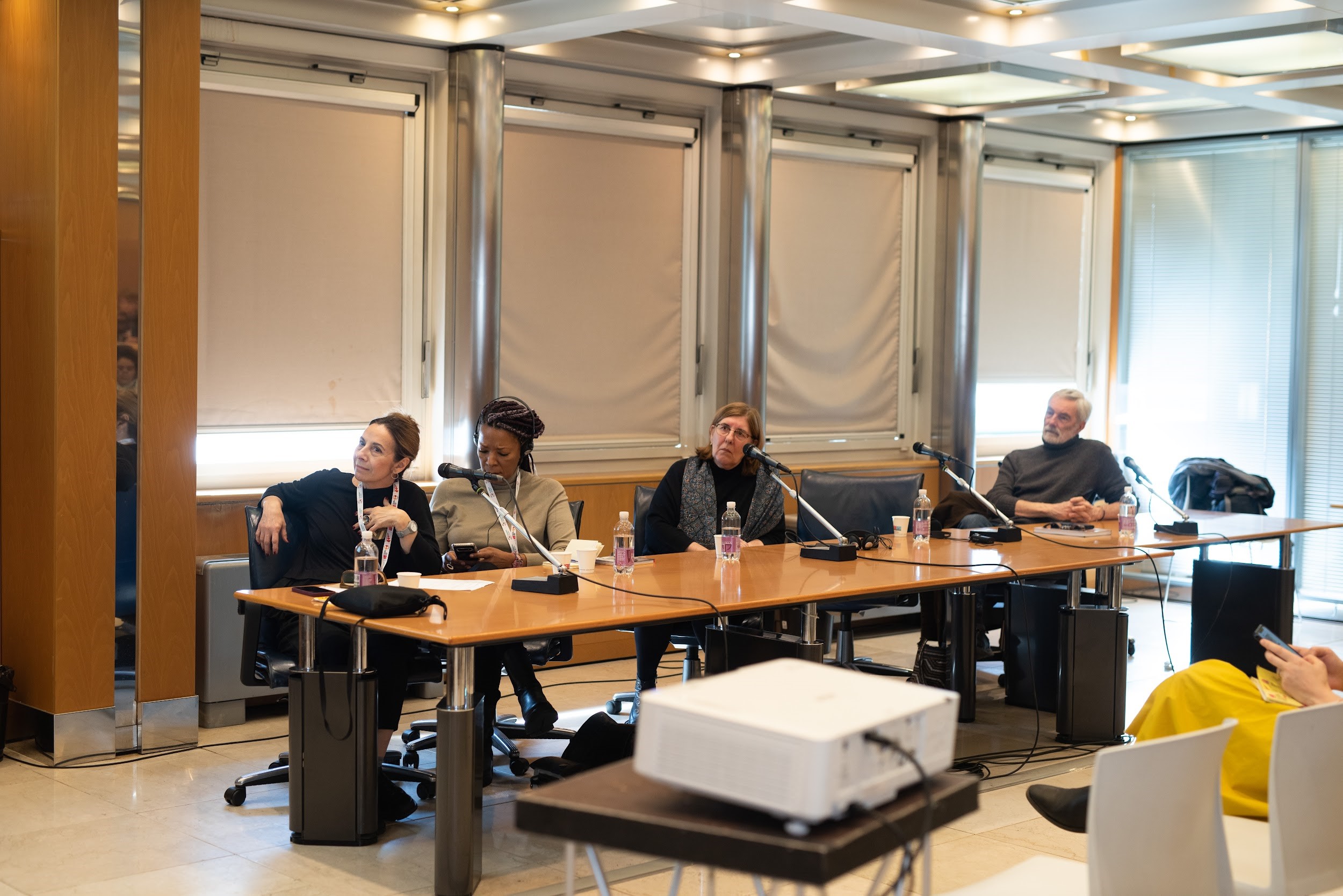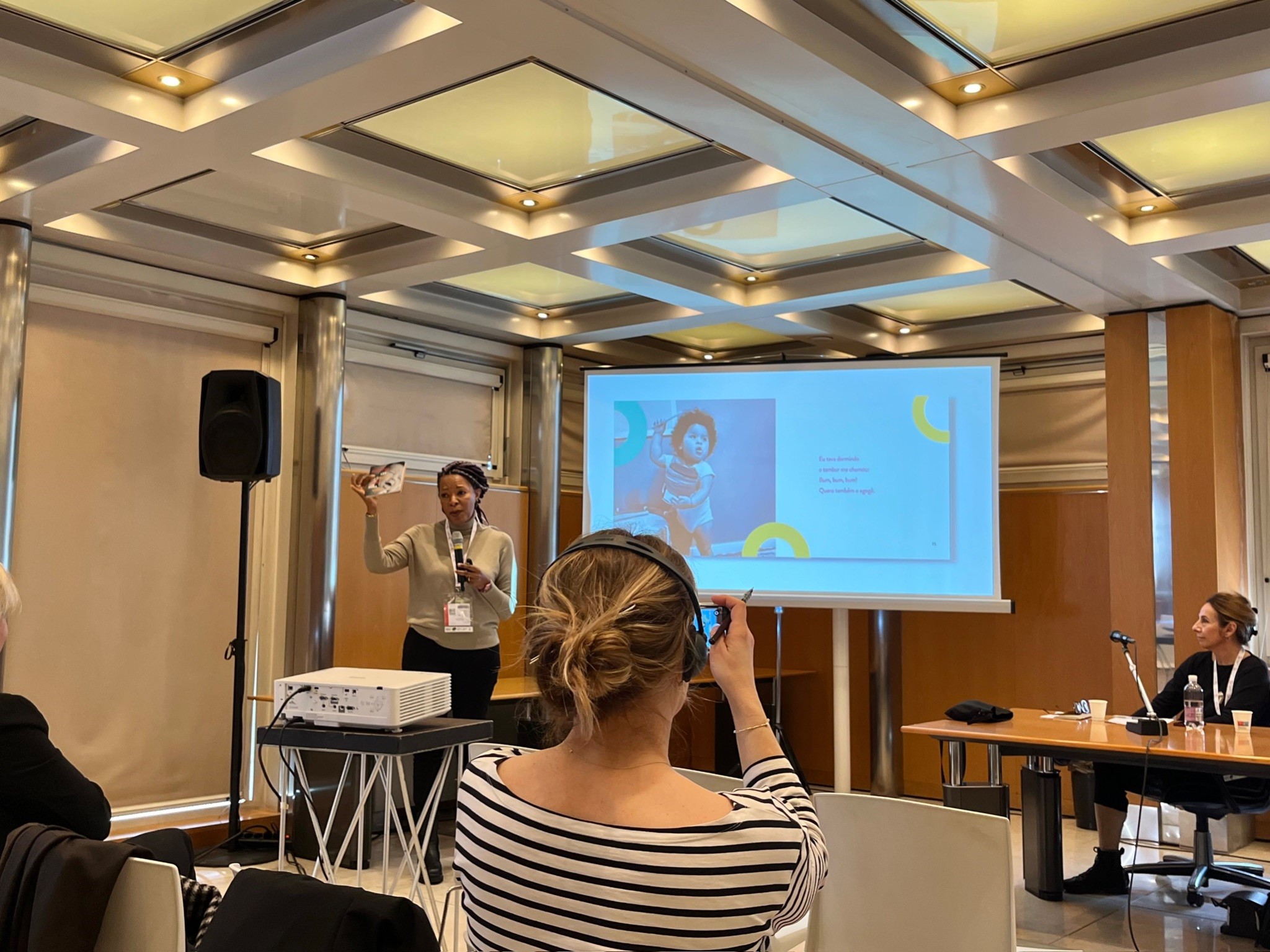
Get the latest updates in your inbox and sign up for more info!
The Bologna Children's Book Fair is a hub of creativity and innovation in children's literature, bringing together publishers, authors, and illustrators from around the world.
This year, we're excited to share the perspective of a talented NYU intern who has attended the fair with a sharp eye and a passion for storytelling.
In this blog post, she offers her insights and reflections on the latest trends and innovations in the field of children's books.
Join us as we explore the magic of the Bologna Children's Book Fair through her eyes!
In early childhood, studies have shown that reading is positive for child development and academic success. For underprivileged communities in particular, literacy plays a key role in creating an equitable society. In a panel of experts from different countries and disciplinary backgrounds, speakers shared their work promoting literacy as a factor in emotional and cognitive development and discussed the impact of literacy programs around the world.
For Giorgio Tamburlini, managing director of Centro per la Salute del Bambino (CSB), promoting literacy from early childhood requires international cooperation and a multidisciplinary approach, much like the Born to Read panel. Early intervention centering the family is key, and educators, psychologists, pediatricians–the entire community–each have a role to play. Nati per Leggere is one of the CSB’s projects that aims to provide children with emotional and cognitive development opportunities through reading. Some of the main activities of this campaign include organizing training for pediatricians and healthcare professionals, creating reading labs with parents, and advocacy.
Tamburlini describes Nati per Leggere as an “equity maker,” as literacy has been shown to improve academic success, opening doors to even more opportunities. In fact, as co-director of the Mikhulu Trust Lynne Murray explained, “In Southern Africa, literacy is the most powerful way for children to escape poverty–especially for girls.”
Despite the immense benefits of literacy, many are still unaware of the link between achievement in school and time spent reading. Pediatrician Marija Radonić shared statistics about the state of reading in Croatia, where studies showed that parents don’t enjoy reading or believe that their children enjoy reading, and are unaware of the role reading can play in their child’s success in school. Governmental research further found that 30% of students didn’t enjoy reading, and Croatian students were below average in both school achievement and reading literacy. This shows a link between literacy and education, which the panelists each addressed on local and national levels in their own work.
In contexts where social inequality levels are high and not all children are able to go to primary school, reading in the home becomes even more crucial. To address this, Lynne Murray introduced book sharing programs in Khayelitsha as a way to promote literacy in cultures that do not often spend time reading with children. To make this possible, she trained parents in the community, selected by a community council, as leaders who could help other local parents. This included showing them short videos of parents reading to children, giving them the confidence that they could do the same. Then, the parents would attend a one-to-one session for further support and receive a book to take home and read to their children every week.

In the book sharing program, providing books that are relevant and accessible within the local context is key. In Khayelitsha, many parents can’t read, so using images and encouraging parents to talk about the emotions in the characters’ faces is a helpful strategy. The program also worked with local artists, making the content of each book more meaningful for the community. This is similar to a community library project in Parelheiros, São Paulo, where many parents don’t know how to read and write. “They didn’t know how to write,” Bel Santos Mayer, educator and creator of the project describes, “but they know how to read the world.” Working with this community, she described the process of starting with photographs and later adding short poems accompanying the images to create an entire book tailored to them.
The results of these programs are substantial. In Parelheiros, Santos Mayer noticed that 58.2% of mothers in the program had more than six books in their home, and 48.5% were reading to their children at least two times per week. This has great implications for both cognitive and emotional development: Murray noted an increase in parental sensitivity as parents became more sensitive to their child’s interests and cues and reading aloud became a more reciprocal process. Attention spans, empathy, and behaviour also improved, which teachers in the community noticed. Importantly, more children started to enjoy reading and began looking at books themselves–the beginning of a lifelong love for reading.
Based on these results and the long term benefits of reading, Radonić sees literacy as an important aspect of public health. Moving forward, she believes that pediatricians should be at the centre of literacy initiatives, providing books for children at an early age and speaking with parents about the role reading can play in child development. The benefits of reading aloud with children should not be underestimated and mark a significant step towards creating a more equitable world. (in the picture: Bel Santos Mayer shows one of the books created for the Parelheiros community)